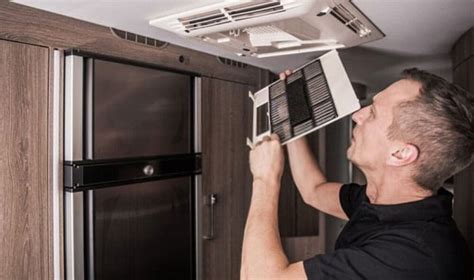How To Quiet Rv Ac
Ronan Farrow
Apr 02, 2025 · 3 min read

Table of Contents
How to Quiet Your RV Air Conditioner: A Guide to Peaceful Camping
RV air conditioners, while essential for comfortable camping, can be surprisingly loud. The constant hum and rumble can disrupt sleep and conversation, making your otherwise idyllic getaway less relaxing. Fortunately, there are several ways to significantly reduce the noise your RV AC produces. This guide will explore various methods, from simple tweaks to more involved modifications, to help you achieve a quieter camping experience.
Understanding RV AC Noise: Identifying the Source
Before diving into solutions, let's pinpoint the sources of the noise. RV AC units generate noise from several components:
- Compressor: This is often the loudest part, responsible for circulating refrigerant. The vibrations from the compressor are a primary source of noise.
- Fan Motor: The fan motor, both inside and outside the unit, contributes to the overall noise level.
- Airflow: The movement of air through the vents and ducts can create noticeable noise, especially with worn-out seals or loose fittings.
- Vibration Transfer: The unit's mounting and the chassis of the RV itself can amplify vibrations, leading to increased noise throughout the RV.
Practical Steps to Reduce RV AC Noise
Here are actionable strategies to quiet your RV's air conditioner:
1. Improve Insulation and Sealing: Dampen the Sound
Poor insulation and air leaks can amplify noise from the AC unit. Consider these improvements:
- Seal Air Leaks: Inspect seals around the AC unit's interior and exterior vents. Replace any damaged or worn seals with high-quality weather stripping. Pay attention to any gaps around the unit's mounting.
- Add Insulation: Increasing insulation around the AC unit and in the walls of your RV can help absorb noise and reduce vibrations. Consider adding sound-dampening materials like acoustic foam or mass-loaded vinyl to the walls near the AC unit.
2. Reduce Vibrations: Stabilize the Unit
Vibrations are a major contributor to AC noise. These steps can effectively minimize them:
- Secure Mounting: Ensure the AC unit is securely mounted. Loose bolts or brackets can significantly increase vibrations. Tighten all fasteners and consider adding vibration dampeners (rubber pads or grommets) between the unit and its mounting bracket.
- Vibration Dampening Pads: Place vibration dampening pads under the air conditioner unit itself. These pads absorb vibrations, preventing them from transmitting through the RV's structure.
3. Maintain Your RV AC: Prevent Problems from Worsening
Regular maintenance can prevent minor issues from escalating into significant noise problems.
- Clean the Condenser Coils: A clogged condenser coil restricts airflow, forcing the compressor to work harder and producing more noise. Regular cleaning will improve efficiency and reduce noise.
- Lubricate Moving Parts: While not all parts require lubrication, some moving components, such as the fan motor, may benefit from periodic lubrication with appropriate lubricant. Consult your RV's manual for recommendations.
- Inspect Belts and Pulleys: Worn or misaligned belts and pulleys can cause squeaking or squealing noises. Replacing them as needed can restore quiet operation.
4. Consider a Noise-Reducing Cover (External): Muffle the Sound Source
While not a fix for the root cause, a noise-reducing cover specifically designed for RV air conditioners can help absorb some of the sound emitted by the outdoor unit. These covers are often made from sound-absorbing materials.
5. White Noise Generators or Fans: Mask the Noise
If the noise is still bothersome, consider using a white noise machine or fan to mask the sound of the air conditioner. This is more of a workaround but can still provide improved sleep quality.
Conclusion: A Quieter RV Experience Awaits
By systematically addressing the sources of noise and implementing these practical solutions, you can significantly reduce the sound your RV air conditioner produces, creating a more peaceful and enjoyable camping experience. Remember that a combination of these strategies will often yield the best results. Don't hesitate to consult with an RV repair professional if you're unsure about any of these steps.
Featured Posts
Also read the following articles
| Article Title | Date |
|---|---|
| How To Register A Boat In Maine | Apr 02, 2025 |
| How To Sell A Gun In Illinois | Apr 02, 2025 |
| How To Take Rad 140 Liquid | Apr 02, 2025 |
| How To Sprout Persimmon Seeds | Apr 02, 2025 |
| How To Replace Camper Ceiling | Apr 02, 2025 |
Latest Posts
Thank you for visiting our website which covers about How To Quiet Rv Ac . We hope the information provided has been useful to you. Feel free to contact us if you have any questions or need further assistance. See you next time and don't miss to bookmark.
